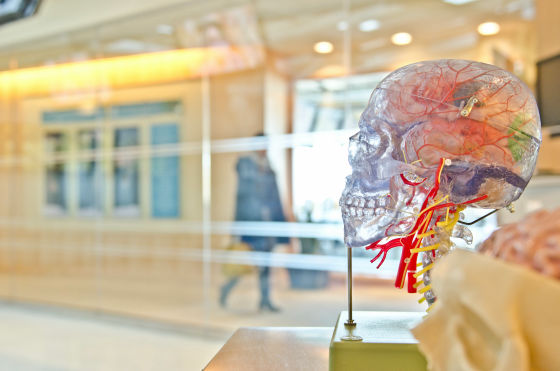Why is speaking 'bilingual' being said to keep the brains young as they rotate the head faster?

by Porapak Apichodilok
As a result of scientific research so far, bilingual ( bilingual speaker) who speaks a language other than the mother tongue and multilingual (multilingual speaker) have high cognitive abilities and also can prevent dementia by studying multilingual It is said to be connected . "Talking about different languages will change the way the world recognizes the world", "Bilingual brain is obviously different from monolingual learning only one language" such as how to use multiple languages It is written by journalist Gaia Vince whether it affects it.
Science suggests bilingualism helps keep our brains smart, agile and young - Quartz
https://qz.com/753528/science-suggests-bilingualism-helps-keep-our-brains-mentally-fit/
In the 19th century imperialism, speaking of languages other than their own languages was thought to be confidential, so raising children bilingually in the UK and elsewhere, mainly in the UK, is a "bad influence on health and society" It was thought to exert. Children who were confused by the two languages said that intelligence and self-esteem became low, they became to take off-ordered behavior, and schizophrenia was said to be said. And this kind of idea continued until relatively recent.
However, as scientific research improves understanding of languages, a number of influences that "speaking multilingual" has on people will be revealed, and this idea will be overturned.
For example, one of the experiments conducted by Dr. Panos Athanasopoulos who conducts research on psycholinguistics and bilingual cognition at the University of Lancaster, to show English movies and German speakers' movies and let them explain it There are things. At this time, an English speaker takes notice of "motion" and explains "Women are walking", whereas German speakers totally grab the sight and " He said that he was tending to answer "I am walking."

by Gaelle Marcel Follow Message
Similar experimental results were also reported in the 1960s. Susan Irvin Trip, one of pioneers in psycholinguistics , conducted an experiment to instruct women who are Japanese and English bilinguals to complete sentences in their respective languages. As a result, the sentence following "When my wish was not compatible with my family" continues as "it will be a very sad time" if it is in Japanese, whereas in English, "I will do what I want to do" The difference seems to be seen.
From such experiments, Mr. Trip concludes that "human thought is made in thought by language".

by rawpixel.com
According to this way of thinking, bilingual has plural different personality and way of thinking. In fact, people who speak multiple languages may also report that "speaking languages are different, they feel like being different people." Different thoughts and personality seem to conflict within one human being, but bilingual brain does not cause confusion, it is possible to select the language to use. On the contrary, research conducted over the past several decades indicates that bilingual demonstrates high performance in cognitive tasks and social tasks, as well as high empathy, compared with those who use only one language.
This is believed to be due to the development of the brain region called " anterior cingulate cortex (ACC)" bilingual. ACC is located in the frontal lobe, it is like a "concentration tool box" that allows you to "concentrate on one thing, block other information," "switch intensive tasks without confusion" That part and thing.

by jesse orrico
Jubin Abutalebi, a neuropsychologist at the University of San Rafael, claimed that "The brains of people who speak two languages and those who speak only one language can easily be identified by simply looking at the brain scan images" It is. Abutalebi says, "Bilinguals have much more anterior cingulate gray matter than those who speak only one language." ACC is something like muscle, it is stronger, more bigger and more flexible as we use it.
Bilingual is always in the mind because the two languages compete for concentration, ACC tends to develop. Studies that scan bilingual brains show that ACC is suppressing the impulse to use another language when bilingual speaks in one language and when and how to use the target language It has been shown that decision making is constantly being done.
For this reason, for example, a person who says "Because my mother tongue is Polish but my wife is Spanish, I also speak Spanish, but I use English on a daily basis" people misunderstand Spanish words when talking to my wife in English Although it sometimes happens, it says it will not put out Polish words. Also, when a man is talking with an in-law mother in Spanish, English that the mother-in-law does not understand never mistakenly talks. Even if he is unconscious, because ACC is constantly working, there is no mistake to say a language which the other party does not understand.
Although speaking two languages has a positive influence on the brain as described above, the interesting thing is that this effect will be demonstrated even when it is older.

by Cristian Newman
Ellen Bialystok, a psycholinguist at York University, compared brains of elderly bilingual / monolingual brains and as a result, "Even if the condition of disease progresses the same way, bilingual is more likely to develop symptoms compared to monolingual, It is reported that it is five years later ". For this reason Bialystok believes bilingual is because gray matter is developed, so it is possible for a brain to compensate for it and to make another route. However, it is said that such a difference will change with "how often you use bilingual language". "Although I learned French a little at school when I was a child" may not be very effective, it seems that the effect will increase as you use more than one word.
In addition, Bialystok discovered that the number of people with bilingual compared to monolingual people was about twice the number of people with normal cognitive abilities in a survey of 608 survivors of stroke It is.
However, in recent years there is also a skeptical opinion about such "profit brought by bilingual". There are reports that failing to reexamine the research that "speaking two languages activates ACC", others who have questioned the idea that activation of ACC brings benefits on a daily level.
"Although it is impossible to investigate" Whether children will be able to take good points in school tests "by speaking two languages because of multiple factors," Bialystok said, Knowing the language of society has many social and cultural benefits and it is recommended to use multilingual because it is bilingual so far that there is no research result that kids' performance will be deteriorated It is said.

by Ben White
Even those who have already graduated from school are not too "too late" to learn different words from their mother tongue. Alex Rawlings, speaking 15 languages, said, "The new language will tell you a whole new lifestyle, a whole new meaning, to the point of being addicted" "Learning a new language is too difficult for adults," You can tell me that if you are over 8, you can learn much easier than babies, babies spend 3 years learning the language, but adults can learn in a few months. "
Related Posts:
in Note, Posted by darkhorse_log







